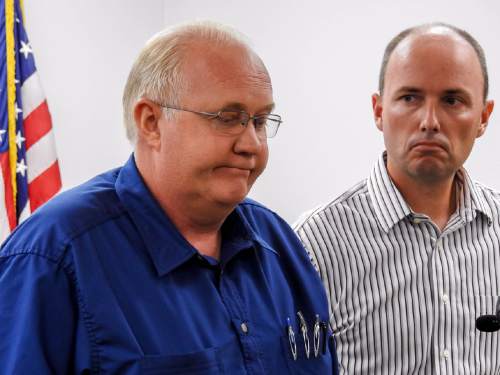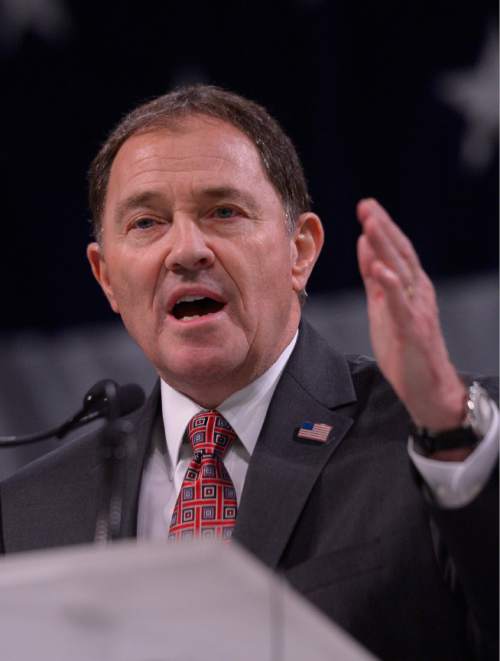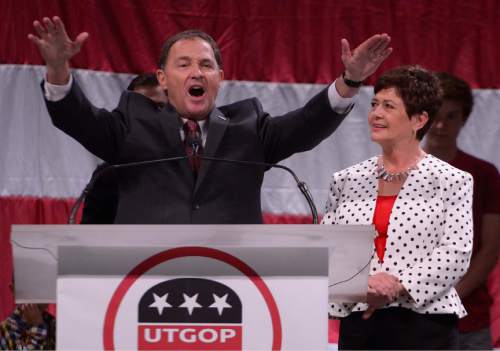This is an archived article that was published on sltrib.com in 2016, and information in the article may be outdated. It is provided only for personal research purposes and may not be reprinted.
Gov. Gary Herbert's campaign is pitching a novel fundraising approach, granting one-on-one meetings with the governor in a speed-dating-style format for donors who give generously to his re-election efforts.
The tactic, presented by the governor's campaign staff at a meeting at the exclusive Alta Club in downtown Salt Lake City on Wednesday to more than two dozen well-connected lobbyists and supporters, was alarming to several in attendance.
"I think everyone who was there was like, 'Too much,' " said one of several lobbyists who spoke on condition of anonymity in order to not upset the governor or his staff. "It made people cringe."
The governor was present but his campaign staff did most of the talking, the sources said, although Herbert did suggest that other members of his staff would essentially be running the office while he focused intensely on the election.
Herbert's campaign spokesman, Marty Carpenter, said the campaign has to raise money for the primary race and plans to run a strong campaign, but the governor always puts the state first and was clear that there would be no special treatment to donors.
"The governor specifically said, 'This should be crystal clear; there will be no quid pro quo. We appreciate your support, but we put up a solid wall between financial support for our campaign and any type of political favors,' " Carpenter said.
Dave Hansen, campaign manager for Herbert's Republican challenger, Jonathan Johnson, said the speed-dating scheme appears to be an attempt to sell face time with the governor.
"It sounds like a pay-to-play program, and the Utah voters and Utah citizens should be outraged that this is going on, this Chicago-style politics, in Utah. It's definitely not the Utah way," said Hansen.
According to several lobbyists who attended Wednesday's meeting, Liv Moffat, Herbert's fundraising director, said the governor had recently sat in the office of lobbyist Doug Foxley, who is working on the governor's campaign and had "paraded seven clients" through to meet with Herbert.
Each got about 20 minutes of "good, quality" one-on-one time with the governor, Foxley said, the lobbyists recounted. Moffat said the campaign was "collecting checks and talking specifically about their issues" with the governor. There was no set price tag on the meetings, but Moffat said they weren't going to do it for just $1,000.
One lobbyist, Jodi Hart, spoke up and questioned the arrangement, saying she didn't think her clients would be comfortable paying to discuss policy matters with the governor, according to sources present. Lt. Gov. Spencer Cox stepped in and told her there was "no quid pro quo" resulting from the contributions.
Carpenter said the lobbyists who attended the Wednesday meeting represent businesses or associations that have said they want to support the governor, so the meetings in Foxley's office were coordinated for several of Foxley's clients to deliver checks and show their support.
"Doug Foxley and [his partner] Frank Pignanelli represent a number of clients that want to support the governor," Carpenter said, "and they say they want to make a donation and they want to show their support to the governor, so they want to deliver the check. So [Foxley] coordinated those."
According to the sources, Herbert told the lobbyists on hand that he had held similar meetings at the governor's mansion and that he would make himself available to meet with donors whenever he was needed.
Herbert said that, until the primary election on June 28, Cox and the governor's chief of staff, Justin Harding, would be running the state.
"He was exaggerating for effect there," said Carpenter. "The governor has always got his hand on the controls. I think the point he was trying to express there is his focus will, out of necessity, have to be on the campaign over the next eight weeks, but never at the expense of the decisions that need to be made to govern the state."
University of Utah political science professor Tim Chambless said the governor's meetings with donors appear problematic to him, but ultimately it will depend on how voters perceive the issue.
"There's a difference between the law and ethics. It's legal. It comes down to: Is it ethical?" Chambless said. "There's money involved, and the question is to what extent there is a quid pro quo here. You would hope all it does is give access. … [But] the average person in Utah doesn't get 20 minutes alone in a face-to-face with the governor."
The governor's campaign plans to raise money for the primary cycle aggressively in the coming weeks, holding five major events before the June 28 primary, beginning with the Governor's Golf Classic on May 9.
His $1,500-per-seat Energy Roundtable will be May 24; The $250-per-person Governor's Shootout, a breakfast and shooting event, will be May 26; the Healthcare Roundtable is scheduled for June 1; and he will host a second golf tournament on June 13, for $3,000 per foursome.
His annual gala is scheduled for Sept. 17 and will cost $5,000 for a table of eight.
"Over the next eight weeks, we're going to be engaged in the primary campaign," said Carpenter. "The governor is not an independently wealthy man. He's not a multimillionaire like his opponent. He's not going to get a blank check from [Overstock CEO] Patrick Byrne. … Because of that, he does have to raise funds."
Byrne, a controversial figure in the business world with decidedly libertarian political views, has given generously to help Johnson, who is the chairman of the board of Overstock.
Johnson defeated Herbert at the Republican State Convention on Saturday, 55 percent to 45 percent, moving both into the June primary. Herbert has a big advantage heading into that primary contest, according to poll numbers that were shared at the lobbyist meeting.
Herbert has an 82 percent approval rating, compared to 24 percent for Johnson, although nearly six in 10 voters have no opinion of Johnson. In a head-to-head matchup, Herbert leads 71 percent to 16 percent.
Carpenter would not confirm the numbers, but he said he is confident that the governor "has broad support" among the primary voters.
Twitter: @RobertGehrke







